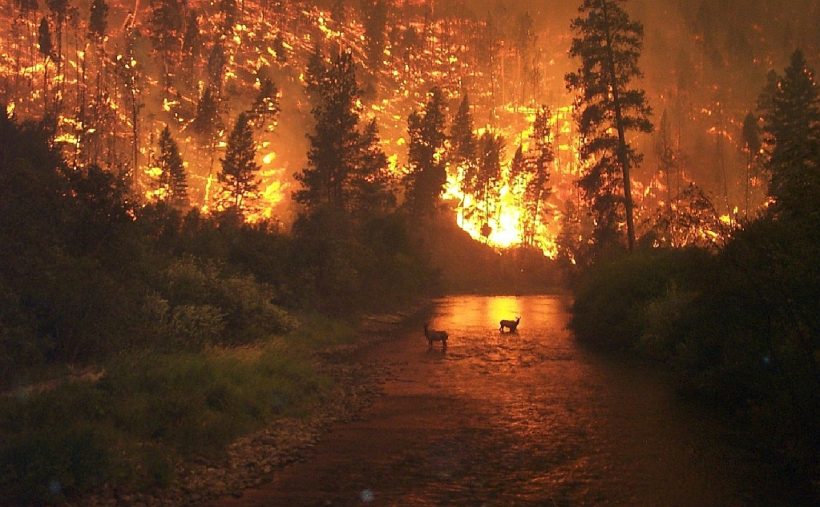Wildfires are incinerating forests in the American West, Turkey, Greece and Siberia, destroying millions of acres, burning entire towns to the ground, and blanketing vast regions under plumes of smoke stretching thousands of miles. The term “megadrought” is now used to describe droughts that last for decades, baking the landscape, leaving once-brimming reservoirs dangerously low, and threatening to leave whole cities without water. In Germany and China, torrential storms recently dumped a year’s worth of rain in a matter of days, causing floods that swept hundreds of people to their deaths. Hurricanes and typhoons are occurring earlier, with higher frequency and strength, devastating island nations and coastal communities.
“Human influence on the climate system is now an established fact,” the United Nation’s Nobel Peace Prize-winning Intergovernmental Panel on Climate Change, the IPCC, says in its newly-released Sixth Assessment Report, its first major report on the science of climate change in eight years. “In 2019, atmospheric CO2 concentrations were higher than at any time in at least 2 million years,” the report states.
U.N. Secretary-General António Guterres called the report a “code red for humanity.” The 4,000-page document offers a detailed synthesis of over 14,000 scientific papers, painstakingly reviewed by 234 experts from 66 countries. They were assisted by over 500 contributing authors and received over 78,000 editorial comments prior to publication. The report includes the warning, “unless there are immediate, rapid and large-scale reductions in greenhouse gas emissions, limiting warming to close to 1.5°C or even 2°C [ 2.7-3.6 °F] will be beyond reach.”
Those two temperatures define what scientists, policymakers, world leaders and climate activists have long identified as the narrow range, the lower and upper limits of global heating caused by humans, that we as a species can allow to occur if we hope to maintain a livable planet. According to this new IPCC report, we have already heated the planet by about 1.2°C over pre-industrial levels. While that may sound small, it has already had planet-altering impacts.
“We shouldn’t be thinking about this as though there is a magic line at one-and-a-half degrees [Celsius] or at any level below which we’re safe and above which we’re not,” climate scientist Bob Kopp, one of the IPCC report’s authors, said on the Democracy Now! news hour. “Every bit of warming… increases the risks that we face.”
In 2015, almost every nation signed the Paris Agreement, the landmark climate treaty that affirmed each country’s commitment to reducing greenhouse gas emissions. More than five years later, the rulebook for how the Paris Agreement will be implemented has yet to be agreed on.
The United States, as the world’s wealthiest nation and its historically greatest polluter, has a responsibility to act, not only to rapidly transition its own economy off of fossil fuels, but to help fund that transition globally.
While campaigning for president, Joe Biden, promised ambitious climate action, in stark contrast to his climate-change-denying predecessor. After taking office, Biden immediately blocked the Keystone XL pipeline, but allowed the Dakota Access Pipeline to continue operating. He also refused to halt construction of the Enbridge Line 3 pipeline in
Minnesota, where thousands have gathered this summer to join indigenous-led protests and where many have been violently arrested. Biden has also urged OPEC oil producing nations to increase production to bring down gasoline costs.
Nevertheless, Biden has included elements of a Green New Deal in his “Build Back Better” agenda, setting new, higher standards for energy efficiency and clean energy, expanding incentives for clean electricity, electric vehicles, and clean energy manufacturing, and creating a Civilian Climate Corps. Budget Committee Chair Senator Bernie Sanders has just submitted a $3.5 trillion budget framework to fund these initiatives and more. Senate Majority Leader Chuck Schumer pledges to pass the bill by mid-September using the Senate’s reconciliation process to defeat an expected Republican filibuster.
Meanwhile, the United Nations is moving ahead with its “COP26” climate summit in Glasgow this November, after cancelling the meeting last year due to the pandemic.
“The Glasgow summit, COP26, is going to be perhaps the most significant we’ve had,” said Bangladeshi climate scientist Saleemul Huq on Democracy Now! “It’s [time] for the rich countries to do what they agreed to in Paris: keep the global temperature below 1.5 degrees and provide $100 billion a year to developing countries to tackle climate change. They promised but didn’t deliver.”
The costs of shifting to a renewably-powered, fossil-fuel-free society will be enormous. But the costs of inaction are incalculably higher, not only in dollars, but in suffering, displacement, destruction and death. Global mass movements for climate justice, many led by youth, are growing. Ultimately, this is the greatest hope for change during this crucial, narrowing window to save the planet.










